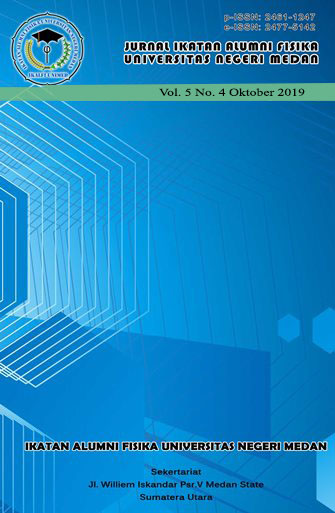MODEL INKUIRI DAN BERPIKIR KREATIF TERHADAP
DOI:
https://doi.org/10.24114/jiaf.v5i4.16080Keywords:
Inkuiri, Kemampuan Berpikir Kreatif, Keterampilan Proses Sains.Abstract
Penelitian ini bertujuan untuk menganalisis Keterampilan Proses Sains (KPS) siswa yang diajarkan dengan model inkuiri (MI), menganalisis Keterampilan Proses Sains (KPS) siswa yang memiliki kemampuan berpikir kreatif, dan interaksi antara model pembelajaran inkuiri dan pembelajaran konvensional dengan kemampuan berpikir kreatif. Penelitian ini merupakan penelitian quasi eksperimen dengan desain two group pretest posttest design dan desain anava. Pemilihan sampel diambil secara cluster random class. Sampel dibagi dalam dua kelas, kelas eksperimen diajarkan dengan MI dan kelas kontrol diajarkan dengan pembelajaran konvensional. Instrumen yang digunakan terdiri dari tes KPS dan tes Kemampuan Berpikir Kreatif (KBK) dalam bentuk essay. Hasil penelitian menunjukan bahwa model pembelajaran inkuiri lebih baik dibandingkan dengan pembelajaran konvensional dalam meningkatkan KPS. KPS siswa pada kelompok siswa yang memiliki KBK tinggi lebih baik dari siswa yang memiliki KBK rendah, serta terdapat interaksi antara MI dengan berpikir kreatif untuk meningkatkan KPS siswa.References
Dahar, R.W. (2011). Teori-teori Belajar dan Pembelajaran. Jakarta: Erlangga.
Evan, JR. (1991). Creative Thinking in the Decision and Management Sciences. South-Western: Thomson Publishing Group.
Joyce, Bruce. (2009). Model of Teaching. Yogyakarta: Pustaka Belajar.
Khan, M., & Iqbal, M. Z. (2011). Effect of Inquiry Lab Teaching Method on The Development of Scientific Skills Through The Teaching of Biology in Pakistan. Strength for today and bright hope for tomorrow journal 1(1), 170-171.
Nasution, S. (2008). Berbagai Pendekatan dalam Proses Belajar dan Mengajar. Jakarta: Bumi Aksara.
Pandey A., Nanda G.K., Ranjan V. (2011). Effectiveness of Inquiry Training Model over Conventional Teaching Method on Academic Achievement of Science Students in India. Journal of Innovative Research in Education 1(1), 7-20.
Pehkonen, E. (1997). The State-of-Art in Mathematical Creativity. [Online]. http://www.fiz.karlsruhe.de/fiz/publications/zdm, diakses tanggal 15 Februari 2011.
Remziye. (2011). The Effects of Inquiry-Based Science Teaching on Elementary School Student Science Process Skills and Science Attitude. Bulgarian Journal of Science and Education Policy (BJSEP), 5(1), 47-68
Rustaman. (2003). Keterampilan Proses Sains. [Online], http:biopointtenten.blogspot.com/2010/08/keterampilan-proses“sains-kps.html, diakses tanggal 23 Oktober 2014.
Sani, R.A. (2014). Pembelajaran Saintifik untuk Implementasi Kurikulum 2013. Jakarta: Penerbit PT. Bumi Aksara.
Sugiyono. (2006). Statistika Untuk Penelitian, Cetakan Ketujuh, Bandung: CV. Alfabeta.
Wartono. (2003). Strategi Belajar Mengajar Fisika. Malang: Universitas Negeri Malang.
Zubaidah, S., Yuliati, L., & Mahanal, S. (2013). Model dan Metode Pembelajaran SMP IPA. Malang: Universitas Negeri Malang.
Downloads
Published
Issue
Section
License
Copyright (c) 2019 JURNAL IKATAN ALUMNI FISIKA UNIVERSITAS NEGERI MEDAN

This work is licensed under a Creative Commons Attribution 4.0 International License.
Authors who publish with this journal agree to the following terms:- Authors retain copyright and grant the journal right of first publication with the work simultaneously licensed under a Creative Commons Attribution License that allows others to share the work with an acknowledgement of the work's authorship and initial publication in this journal.
- Authors are able to enter into separate, additional contractual arrangements for the non-exclusive distribution of the journal's published version of the work (e.g., post it to an institutional repository or publish it in a book), with an acknowledgement of its initial publication in this journal.
- Authors are permitted and encouraged to post their work online (e.g., in institutional repositories or on their website) prior to and during the submission process, as it can lead to productive exchanges, as well as earlier and greater citation of published work (See The Effect of Open Access).


 Jl. Williem Iskandar Psr. V, Medan Estate, Kec. Percut Sei Tuan, Kabupaten Deli Serdang, Sumatera Utara 20221
Jl. Williem Iskandar Psr. V, Medan Estate, Kec. Percut Sei Tuan, Kabupaten Deli Serdang, Sumatera Utara 20221